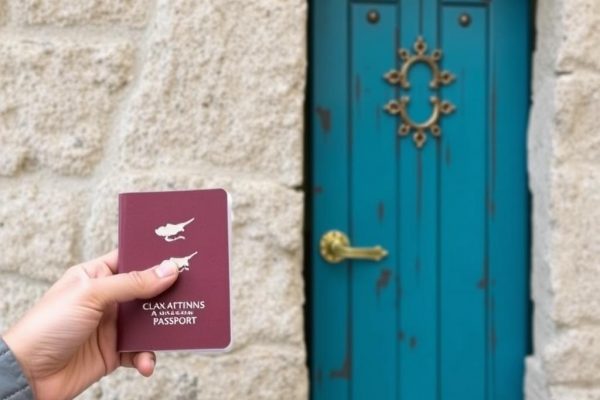Obtaining Cypriot citizenship through investment is a sought-after option for many looking to benefit from the strategic location, business-friendly environment, and European Union privileges associated with a Cyprus passport. To get Cyprus citizenship, applicants typically engage in substantial real estate or business investments, followed by a mandatory holding period Cyprus CBI scheme requires, which lasts five years. Beyond acquiring the passport itself, however, a critical question emerges: what are the practical exit strategies after five years of Cyprus citizenship? How can an individual navigate the investment landscape post-citizenship, particularly regarding the sale of property, maintaining compliance, and optimizing financial returns? This article unpacks these concerns, providing a clear lens on the options that meet the evolving needs of Cyprus passport holders.
Understanding the Holding Period Cyprus CBI
The Cypriot Citizenship by Investment (CBI) program demands a minimum holding period of five years. During this time, the investor must maintain their qualifying investment, often in real estate, business entities, or government bonds, to ensure eligibility and eventual passport issuance. This holding period is pivotal: it protects the integrity of the program and guarantees that citizenship isn’t merely a short-term transaction.
For property-based investments, this translates into a minimum of five years of ownership, after which the investor gains the freedom to consider selling or restructuring their portfolio, all without jeopardizing their citizenship status.
The five-year holding period is not just a formality but serves as a safeguard ensuring the investor’s genuine commitment to Cyprus.
Beyond mere legal compliance, the holding period allows investors to benefit from the stability and appreciation potential of Cypriot real estate markets.
Evaluating the Market: After Citizenship Property Sale Cyprus
Once the holding period elapses, many new citizens face a pressing question: is it practical or advantageous to sell the investment property that secured their citizenship? The Cypriot real estate market, influenced by both local and foreign demand, presents fluctuating prospects that require careful analysis.
Property sales in Cyprus post-citizenship can be appealing due to the island’s steady economic development and increasing tourism. However, key factors must be weighed:
- Market value trends in major cities like Limassol, Nicosia, and Paphos
- Tax implications connected to property sales, including capital gains and transfer costs
- Legal and regulatory frameworks to avoid pitfalls
- Potential reinvestment or diversification opportunities within Cyprus or abroad
Strategic timing is essential to maximize returns while maintaining compliance. Some investors opt to hold onto prime properties beyond the minimum period, leveraging rental income and the asset’s potential appreciation.
Selling property after citizenship requires an informed approach balancing market dynamics and personal financial goals.
Cyprus Citizenship Exit Strategy: Selling Your Investment
Whether you choose to sell after five years or keep your assets, having a Cyprus citizenship exit strategy is a crucial part of long-term planning. For those contemplating a sale, the process involves several important considerations:
- Legal clarity: Ensuring all ownership and tax documents are up to date and clear of liens
- Market readiness: Engaging with real estate experts to identify the optimal selling moment
- Tax optimization: Managing the capital gains tax and related fees effectively
- Reinvestment options: Exploring whether to reinvest in Cyprus property, diversify geographically, or shift into other investment vehicles
When selling the investment tied to a Cyprus passport, transparency is key. The Cypriot government requires clear documentation and proper notification, ensuring the exit does not affect citizenship status, which remains irrevocable once granted, assuming compliance throughout the holding period.
The Cyprus citizenship exit strategy must balance financial advantage with regulatory adherence for a smooth transition.
Benefits and Risks of Selling Investment Cyprus Passport Property
Offloading property tied to citizenship is tempting but comes with benefits and risks. On the upside, selling can unlock capital, grant liquidity, and allow for reinvestment in higher-yield or diversified assets. Many investors view it as an opportunity to rebalance their portfolios after securing citizenship.
On the flip side:
- Property market fluctuations may erode expected returns
- Transaction costs and taxes can reduce net profits
- Potential timing constraints linked to local regulations require careful navigation
Furthermore, while citizenship itself remains secure after the holding period, prematurely selling or mismanaging the underlying investment during the five years can have consequences.
Thus, balancing liquidity, potential gains, and regulatory obligations is vital for anyone considering selling investment Cyprus passport property.
Legal Framework and Tax Implications Post 5-Year Citizenship
After five years and successful acquisition of Cypriot citizenship, the legal landscape shifts subtly. The passport grants full rights akin to native Cypriots, but selling property still triggers standard regulations and taxes applicable to all Cypriot residents and non-residents alike.
Capital Gains Tax (CGT): Applied on the profit made from selling real estate, currently at 20%. Importantly, CGT applies only to gains made since acquisition and after certain exemptions.
Transfer Fees: Typically payable when ownership passes, these fees usually amount to 3% of the property sale price and are split between buyer and seller if negotiated.
A thorough understanding of these factors is essential to precisely assess net returns and fully capitalize on the Cypriot property market after citizenship.
Post-citizenship property sales encounter standard fiscal rules; knowing them protects your gains.
Alternative Exit Strategies Without Selling Property
Not all Cyprus passport holders need to sell their investment to benefit financially or move on from their initial commitments. Several alternative strategies exist:
- Leasing or renting out the property: Generates ongoing income without forfeiting ownership, particularly attractive in tourist hotspots.
- Re-mortgaging: Leveraging the property’s equity to free up capital for other opportunities.
- Property swapping: Exchanging investment properties for others with different geographic or commercial profiles.
These strategies enable maintaining a foothold in Cyprus while optimizing asset utility, a particularly appealing option for those wishing to retain EU passport benefits while adjusting their investment stance.
Holding onto property offers financial flexibility beyond the initial citizenship goal.
Practical Insights from Holders of Cyprus Passport 5 Years After Investment
Insight from investors who have navigated the Cyprus CBI landscape five years on reveals a blend of outcomes and strategies. Some choose to hold property for decades, capitalizing on rental income and long-term appreciation. Others reinvest proceeds from sales into more diversified portfolios in Europe or beyond.
Key lessons include the importance of conducting thorough due diligence before acquisition, engaging local legal and tax expertise, and aligning exit timing with market climates rather than arbitrary dates.
Moreover, frequent updates to Cyprus’s legal framework necessitate staying informed to avoid surprises post-citizenship. Networking with fellow investors and advisors can provide operational and strategic support for those planning their post-holding period moves.
Your Roadmap to a Successful Post-Citizenship Exit
The culmination of five years’ holding period Cyprus CBI investment opens several doors. Whether executing a property sale, restructuring investment portfolios, or leveraging alternative exit strategies, Cyprus passport holders stand to benefit from the island’s favorable legal environment and dynamic market.
Successfully selling investment Cyprus passport property requires a blend of patience, local market understanding, and regulatory adherence. Meanwhile, retaining property opens avenues for steady income and wealth preservation. Each approach offers different advantages depending on personal priorities and risk tolerance.
For the savvy investor, Cyprus citizenship after five years is not merely a status but a strategic foothold in Europe, ready to be leveraged wisely through considered exit strategies that protect and enhance wealth.
Careful planning and informed decisions transform citizenship into a long-term asset, not just a document.
FAQs on Cyprus Citizenship Exit Strategies
- Can I sell my property immediately after getting Cyprus citizenship?
No, the holding period Cyprus CBI requires maintaining the qualifying investment for five years before selling. - Does selling my investment property affect my Cyprus citizenship?
After fulfilling the holding period and obtaining citizenship, selling the property does not revoke citizenship. - What taxes apply when selling property after citizenship?
Standard taxes like capital gains tax (20%) and transfer fees apply to all sellers, including new citizens. - Are there alternative ways to benefit from my investment without selling?
Yes, through renting, leasing, re-mortgaging, or property swapping without losing ownership. - Is reinvestment necessary after selling the original CBI property?
Not mandatory. However, reinvesting can diversify assets and potentially enhance returns. - How can I optimize my Cyprus citizenship exit strategy?
Work with local legal and tax experts, monitor market trends, and align sales with optimal conditions. - Does the Cyprus passport 5 years after investment provide any restrictions?
No, once citizenship is granted, the passport carries full EU rights without specific investment-related restrictions.





